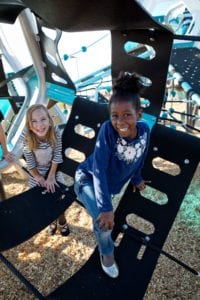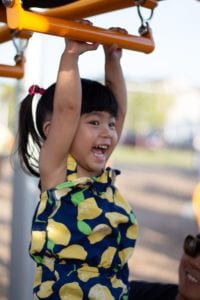Play shapes kids into better adults. Through play, kids learn about themselves, how to interact with others, and they develop physically and emotionally. Play is one of the most organic ways kids learn, and we’re proud to be part of that. That’s why Lone Star Recreation is dedicated to helping communities create the very best, most innovative playgrounds with the highest play value.
Just how important is play? Our manufacturing partner, Landscape Structures, wanted to find out. Read below to learn more about their findings and the science behind play!
The Formative Role of Play and Playgrounds
To build better playgrounds and to encourage more of them, Landscape Structures wanted to understand how play leads to the development of successful adults. That’s why they commissioned a meta-study in partnership with the University of Minnesota Institute of Child Development to advance the conversation.

Purpose
Child’s play, we are learning, is not just fun and games. Whether it’s a young child propelling her swing—and pigtails—to new heights, or a trio of 10-year-olds negotiating dramatic roles atop a playground tower, children’s play behavior appears to be essential preparation for a successful adult life. The purpose of this meta-study was to understand how children’s play behavior on school and community playgrounds contributes to whole-child health and development—including physical, social, emotional and cognitive development.
Methods
Starting with a definition of play behavior, this meta-study drew from a wide body of social scientific analyses, including observational, cohort, longitudinal and case studies, to examine play and playground behavior. It cites a broad mix of experts—educators, child psychologists, playground designers, the American Academy of Pediatrics and others—and covers topics such as motor, language, literacy and social skills; age and gender play differences; physical health and fitness; the development of empathy, creativity and identity; and impact of playground design.
 Results
Results
While the diverse studies approach the topic of playground behavior from different perspectives, they overwhelmingly reinforce the value—and seemingly, the developmental necessity—of children’s early play experiences. Most studies draw strong associations between free, unstructured play and positive outcomes. Several studies also point to society’s growing infringement on children’s play opportunities. Restrictive work and school schedules, organized after-school activities, safety concerns and the rise of passive entertainment options (i.e., T.V. and computer games) all compete with free play time, and may be linked to a 25 percent reduction in children’s unstructured play since 1981.
Conclusions
We can conclude that for children around the world, playgrounds and play are an important and positive part of childhood development. Well-designed playgrounds give children the opportunity to enjoy themselves while practicing a range of physical, emotional, cognitive and social skills—and preparing for success in adulthood. To request a copy of the full research whitepaper, visit Landscape Structures website or you can request from Lone Star Recreation the individual specific playground equipment skills development summaries.
#shapedbyplay
 Results
Results
